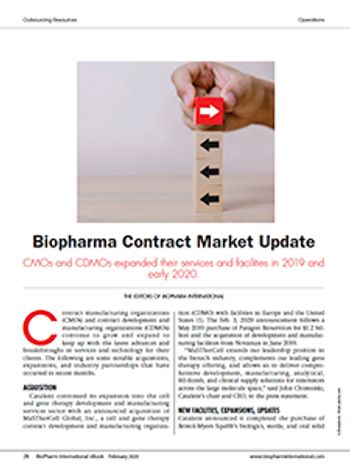
The site can now support customized product and bioprocess development and custom cell and gene therapy reagent manufacturing.

The site can now support customized product and bioprocess development and custom cell and gene therapy reagent manufacturing.

The refurbishment provides enhanced glass melting power, improved glass distribution, and the production of transparent and amber type I glass bottles to meet the increase in demand for glass vials for vaccines and life-saving medicines.

Honeywell Forge Cybersecurity Suite’s improved industrial-grade remote access and added protection and risk monitoring aids remote operations.

The updated facility is 60,000 square feet and is equipped with bioprocessing capabilities ranging from 10L to 2000L.

The company will invest $75 million into its Canton, MA, facility to expand its viral vector, gene therapy, and contract development and manufacturing capabilities.

The company will invest EUR 610 million (USD$682 million) into a new vaccine production site and research center in France.

The company is planning on adding up to 1.5 million sq. ft. of cGMP distribution space for COVID-19 shipments.

The investment will increase production lines for bulk drug substance and will add a fill/finish production line to the site.

Siemens and Exyte partner for fast-track construction of modular, automated, digitalized biopharmaceutical facilities.

The acquisition gives Novovax an annual operating capacity of more that one billion doses of COVID-19 vaccine antigen.

Automated sampling systems and integration of PAT are overcoming some of the roadblocks to increased automation of biopharmaceutical manufacturing processes.

The new facility in County Mayo includes an ISO class 7 cleanroom for the manufacturing of single-use systems.

The company will invest $180 million to construct a new 290,000-ft2 facility in Plainville, MA.

The center will be located at NJIT’s Life Sciences and Engineering center and will feature two good manufacturing practices suites that are expected to be completed and operational during the summer of 2020.

Remote, machine health monitoring services reduce the need for on-site visits.

The goal of the collaboration is to manufacture up to one billion does per year of mRNA-1273, Moderna’s vaccine against the novel coronavirus.

ISPE’s Facility of the Year Awards for 2020 go to bio/pharma companies in eight award categories, including two winners in the new Social Impact category.

As politicians focus on drug cost reduction, biopharmaceutical companies in the US are moving to states with lower taxes and relocating some facilities that had been offshore.

Thermo Fisher is focused on investing to expand three specific areas of demand: biologics, cell and gene therapy, and drug product development and commercial capabilities.

Through the agreement, Bora will obtain ownership of the entire Mississauga site, including all facilities, under the proper regulatory clearances.

The new center expands the company’s R&D capabilities and will help it advance its portfolio of rare disease gene therapy programs.

Single-use and modular systems will meet demand for rapid implementation at different scales.

The expansion gives the company diversified capacity running cell production lines featuring Sartorius-brand 2000-L disposable bioreactors and now GE-brand 2000-L single-use bioreactors.

The 135,000 square foot facility will be constructed over 18 months and is expected to be operational in 2021.

CMOs and CDMOs expanded their services and facilities in 2019 and early 2020.